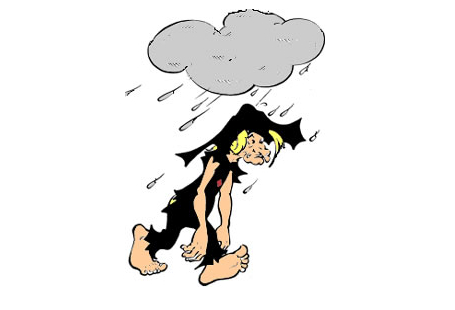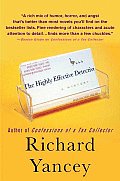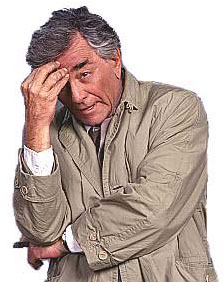"While you're saving your face, you're losing your ass." –– President Lyndon Baines Johnson
"It's a dog-eat-dog world and I'm wearing Milk Bone underwear." –– Norm from Cheers
Winning is very, very important to us. And not just in sports. Politicians are so in love with winning the game of partisan politics that they'll sacrifice the good of their constituents without a qualm if it puts them on the winning side of some political gamesmanship. When actor Charlie Sheen steered his personal life so far out of control that he was fired from the acting job that made him the highest-paid actor on television, he still insisted on Twitter that he was "#winning."
Among mystery protagonists, though, there are some losers who are irresistibly attractive. I don't mean the kind of protagonist who is a loser because he's a hopeless alcoholic, drug addict or otherwise self-destructive. I mean guys who are nerds, mopes, nebbishes or L'il Abner's Joe Btfsplk types, with black clouds always over their heads. Guys who would never dream of winning or even claiming to be winning.
Richard Yancey's Teddy Ruzak has loser written all over him. We're introduced to Teddy in The Highly Effective Detective. Inspired as a child by Sherlock Holmes and Encyclopedia Brown, Teddy always wanted to be a detective. He went straight to the police academy after graduating from high school, but he was booted from the academy after failing their running, driving, marksmanship and scenario training tests. You have to admit he was very good at losing. That's a perfect 100% failure rate.
Teddy followed the path of so many police washouts and became a security guard; in his case, at a bank in Knoxville, Tennessee. Years go by with Teddy working the midnight shift at the bank, putting on weight and getting insulted on a regular basis by Felicia, his favorite waitress at the Old City Diner. When Teddy's mother dies and leaves him some money, he decides to set up his own detective agency. After a few weeks of moping around, he finally gets a client. A wealthy citizen, Parker Hudson, witnessed an SUV mow down some goslings near his home and, after being laughed off by police, he hires Teddy to find the perpetrator.
The fact is, Teddy has no idea how to be a detective. It's even news to him that he has to be licensed by the state. After three weeks of failing to make any progress on Parker Hudson's case, Felicia, whom he's lured away from the diner to be his assistant, has the bright idea of getting newspaper publicity, which brings Teddy a couple of leads, visits from several whack jobs and more assignments. A man offers him a reward to find his daughter's murderer and offers him ever-increasing sums of money not to tell the police once Teddy's identified the culprit. After Teddy refuses several times, the man gives a "final offer" of two million dollars. The response:
"'I'm glad of that, because this sort of reminds me of a parlor game me and my buddies used to play in high school. Well, I call it a parlor game, but it wasn't played in a parlor. We usually played it in my parents' basement. You know, where you'd challenge each other to see how far you'd go for money, along the lines of the old saying that everybody has a price. Like, Would you eat a bowl of dog crap for five thousand dollars? I just grabbed that number out of the air, but usually the dog crap fetched a price closer to a million. I believe I said I'd do it for five hundred thousand. I was in high school, you understand, and when you're that age, you're pretty materialistic. I remember I was ready to give up a foot for two million. Some people never grow out of that state; otherwise we wouldn't have so much insurance fraud, like those people who stage car wrecks.'
He blinked several times, like he had something in his eye, or it may have been just the sting of the dry-cleaning fumes.
'Mr. Ruzak, you are either the most facetious man I have ever met or the most facile.'
'You mean you can't figure out if that was a yes or a no. One of my problems is that I've got a restless mind, probably as a result of spending most of my adult life sitting by myself in the dead of night listening to too much late-night talk radio. They didn't allow televisions, so that was really the only media outlet available to me.'
'I don't think your problem is too much talk radio,' he said."Does this give you an idea of how frustrating it can be for people to talk to Teddy? He's like Columbo. He comes across as a blithering idiot; he knows it and it doesn't bother him. He won't stop asking questions. The person he's talking to has no respect for him and can't resist almost taunting him with what a loser he is. Suspects and witnesses somehow end up telling him much more than they'd intended. And the next thing you know, this loser has pieced everything together.
Yancey has followed up with three more Teddy Ruzak tales: The Highly Effective Detective Goes to the Dogs, in which Teddy is ordered to shut down his agency after failing his PI exam twice, but can't resist investigating the murder of a homeless man in the alley behind his office building; The Highly Effective Detective Plays the Fool, in which Teddy must elude his nemesis from the state, who is after him for working without a PI license, while Teddy investigates the disappearance of a client; and this year's The Highly Effective Detective Crosses the Line. A warning about that last book: it includes an incident of animal cruelty that will make even some fans of the series want to skip it.
Dennis Braintree, David Carkeet's protagonist in his delightful comic mystery From Away, is a Rodney Dangerfield character if there ever was one. He gets absolutely no respect. Dennis is a hapless writer for The Fearless Modeler, a magazine for model train enthusiasts. On a business trip to Vermont, he manages to crash his car and is taken into Montpelier to stay overnight. After a series of odd encounters with locals, he realizes they all think he is Homer Dumpling, a local farmer who has been in Florida for the last three years.
A series of unfortunate events, many precipitated by Dennis's propensity to leap to incorrect conclusions and say and do the wrong thing, makes Dennis decide it's best for him to stay in town and allow everyone to continue to think he's actually Homer, not Dennis. He moves into Homer's country farm and finds it less of a quiet retreat than a handy place for everybody in town to phone him and stop, unannounced, for a visit. It's a challenge for Dennis to figure out who's who and answer questions appropriately, but he soon finds he has a sort of talent for it.
 Most people in town seem to like Homer/Dennis, but some people are mysteriously hostile: Sarah, Homer's supposed girlfriend; neighbor Warren Boren, who keeps leaving threatening phone messages; and Lance, a local police detective and health nut, whose animosity and evident disgust at Homer's/Dennis's fat makes him perversely consume large quantities of food whenever Lance is around. Sarah is outrageously nasty to Homer/Dennis, ridiculing him and ordering him to do a laundry list of home-improvement chores that are far outside his competence.
Most people in town seem to like Homer/Dennis, but some people are mysteriously hostile: Sarah, Homer's supposed girlfriend; neighbor Warren Boren, who keeps leaving threatening phone messages; and Lance, a local police detective and health nut, whose animosity and evident disgust at Homer's/Dennis's fat makes him perversely consume large quantities of food whenever Lance is around. Sarah is outrageously nasty to Homer/Dennis, ridiculing him and ordering him to do a laundry list of home-improvement chores that are far outside his competence.When Dennis, as Dennis, becomes a murder suspect, it's up to Homer/Dennis to keep one step ahead of the law and try to solve the case himself–along with the mysteries of Sarah, Lance and Warren and their animosity toward Homer/Dennis. The book is entertaining as a mystery and a farce, but it also examines the nature of identity, personality and socialization. Dennis is a great creation: funny, wistful, clever and unforgettable.
Is there a moral to all this? I don't know. Maybe we shouldn't be afraid to embarrass ourselves sometimes. Go ahead and ask a stupid question, let your goofball side come out in the open, and don't worry about what other people might think of you. You never know where it might get you.





Sister, I have never read a Teddy Ruzak, but he sounds interesting. Usually the term 'highly effective' in a title sends me fleeing - too many self-improvement books in my youth.
ReplyDeleteI enjoyed From Away; poor Dennis just kept digging himself in deeper and deeper.